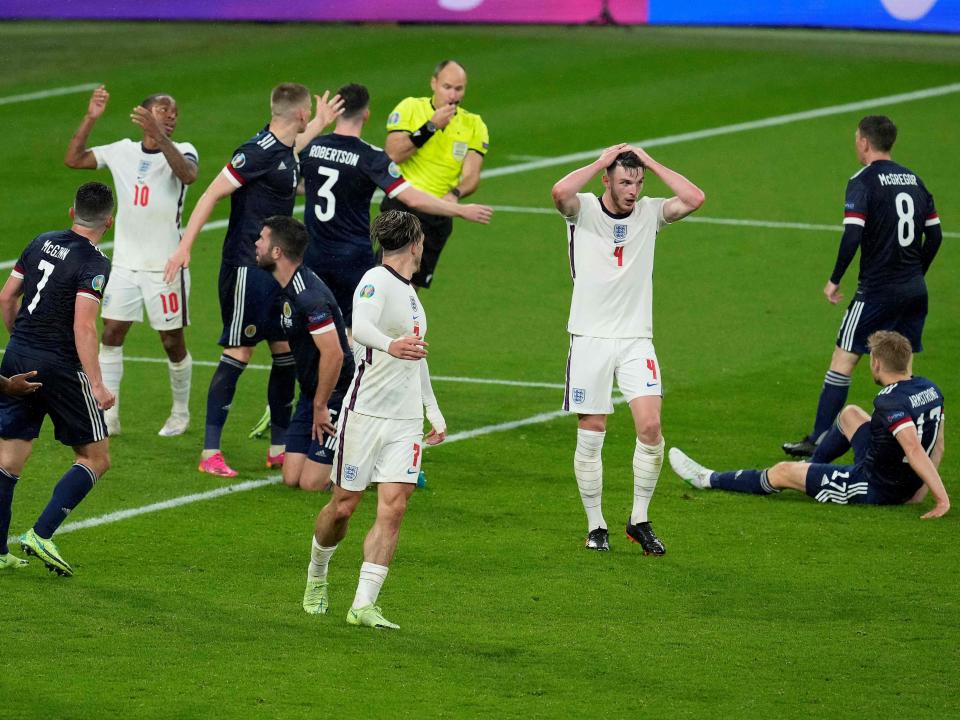England’s lack of substance and sunshine a truer representation of the British game than memories of Euro 96

You will have seen plenty of footage of England and Scotland’s last meeting at a major international tournament over the past week. That fine summer’s day in this part of north west London during Euro 96 has an otherworldly feel about it. The sunshine, the colour, the flair of the football itself and Paul Gascoigne’s wonderful goal is not exactly a full and accurate representation of the British game. For that, fast forward a quarter of a century.
25 years later, we had the dark. We had the rain. We had the low sonic boom of Jordan Pickford panicking into a hoofed clearance. And above all else, we had an attritional pitched battle to match the vast majority of the other 114 meetings. This was the 26th draw in the history of international football’s oldest fixture and founding stone but to Scotland, it was a victory.
That much was obvious from the reactions to the final whistle. On one side, tartan flags and saltires waved around the heads of shirtless supporters. On the other, a few fans clambered over the tarpaulin covering the seats directly behind the goal to offer England’s players that most English of gestures - the two-fingered salute. There were more than a few boos, too. The point practically puts Gareth Southgate’s side into the knock-out stages. Not that you’d know it.
Though few predicted anything positive for the travelling Tartan Army, this felt like Scotland’s night once proceedings began in earnest. The possessed look in Andy Robertson’s eyes, as though in need of a quick pre-match exorcism, suggested that this meant just that little bit more. While some south of the border were already debating whether to finish as runners-up in Group D, those north of Hadrian’s Wall were fighting for survival.
“Most definitely don’t lose the game,” Scott McTominay said this week. “That’s first and foremost. We have to get a result.” They did get their result and Scotland could have had more than that. England may have come closest to scoring through John Stones hitting the upright but from thereon, Scotland were the stronger side, out-shooting their Auld Enemies when all was said and done.
It was as though England were not quite prepared for the more meat-and-potatoes, typically and traditionally British elements that would inevitably emerge from this contest and when they tried to engage, they were woefully out of practice. Southgate said after the win over Croatia that he and his players could not be “football snobs” but years of progressive play and a remodelling of the English game - undoubtedly the correct course of action - left them unprepared for this type of 'stramash'.
Without anyone to take a hold of the ball and move it thoughtfully up the pitch, England too often resorted into the type of long-ball game that was cheap beer to Scotland’s backline, especially the superb Grant Hanley. Perhaps Jordan Henderson’s imminent return will fix that, and the addition of Harry Maguire may help too given how he likes to carry possession up the pitch, but it is a concern going forward.
So too is the form of Harry Kane, who was muted and then substituted for the second consecutive game. Is he tired? If so, it’s not clear whether Southgate can afford to rest him if he wants to beat the Czech Republic and win this group outright.

An over-reliance on Kane as the central striker - despite all the attacking talent surrounding him - was a worry coming into the tournament and it appears as though those fears are being realised.
And in another blow, there was a reminder that there is not always a king over the water. Close-ups of Jack Grealish were cheered by the Wembley crowd and their impatience grew. The demand for his introduction was palpable but, as talented as Grealish is, he was unable to turn the game. The sight of him passing it straight out of play late on, expecting but not receiving an overlapping run from Luke Shaw, summed up England’s disjointed evening.
The introduction of Grealish did not work, nor did that of Marcus Rashford, and Southgate’s reluctance to use Jadon Sancho is developing into another mystery. The England manager’s struggles to affect games from the bench undid his side at the World Cup three years ago and have not eased in the time since. It was fairly clear that this game was heading for a goalless draw from the hour mark onwards.
Perhaps all the nostalgia, all that talk of ‘96 and the endless replays of Gascoigne’s goal had set England and their public up to expect a very different occasion from the one that transpired. There was no sunshine, no colour and no day to remember another quarter of a century from now. Unless, that is, you are Scottish.
Read More
Glasgow’s early night does not stop Scotland fans revelling in a famous day
Jack Grealish is England’s latest saviour - but he cannot do it alone
Harry Kane: England’s system stagnates around sluggish centrepiece against Scotland

 Yahoo Finance
Yahoo Finance 